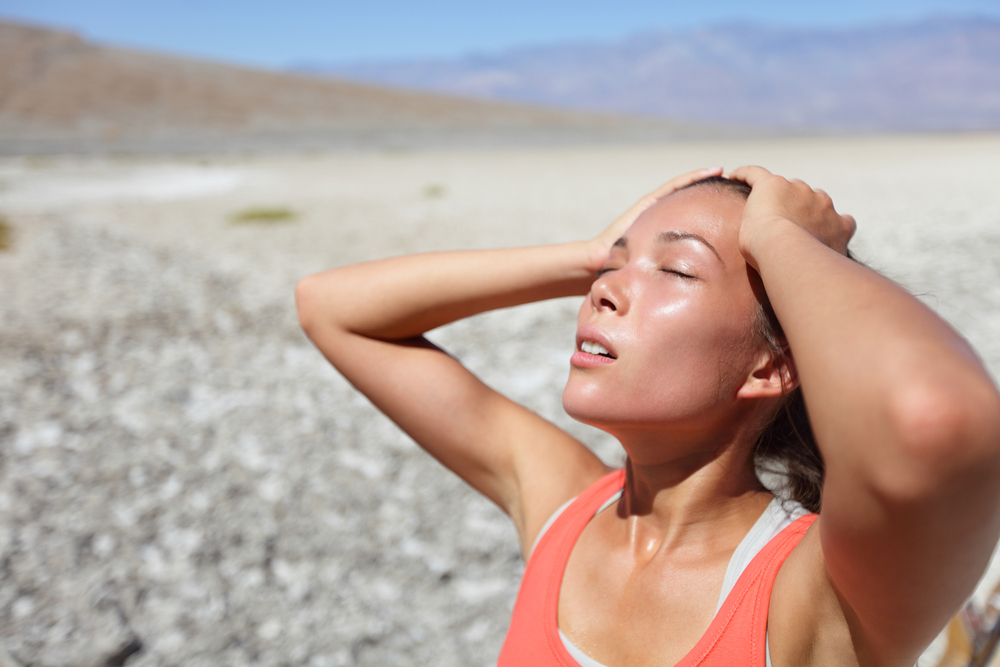And with humidity reaching as high as 90 per cent some might be fighting the frizz, and what we mean is, we’ve seen a few hairstyles of late reminiscent of the monster that sent Monica crazy in Season Nine of Friends … “it’s the humidity!”
Not only is humidity bad for our hair, it can also be bad for our health.
According to the Queensland Ambulance Service (QAS), people in high-risk categories – the elderly, young children and people with health conditions – aren’t the only ones susceptible to heat-related illness.
“If we get hot days where we’re really not used to dealing with these kind of temperatures and that’s combined with strenuous activity, fit healthy people can suffer,” paramedic Paul Boyd says.
On 35-plus degree Celsius days, lifting an arm feels like a strenuous activity, let alone going for a run, which by the way isn’t advised during periods of extreme heat (no Crossfit either).
Ailie Gallant from Monash University’s School of Earth, Atmosphere and Environment wrote about how our bodies react to hot, humid weather in The Conversation, she said days of extreme heat could leave us feeling irritable, uncomfortable and, in the worst cases, unable to cool down at all.
“Stifling conditions during the day, with no relief at night, place physical stress on our bodies,” she said.
Hot all day, no sleep at night! It’s no wonder we’re melting. Yes Anna. I would like to build a snowman.
There are warning signs things could be serious
Indications of mild heat-related illness include:
- Dehydration
- Thirst
- Headaches
“If you’re experiencing thirst then you’re already dehydrated, so it’s a matter of staying hydrated, and keeping out of the sun and yourself cool,” the QAS says.
Still feel like you’re not managing?
- Heat exhaustion is more serious and causes:
- Heavy sweating
- Fast and weak pulse rate
- Fast and shallow breathing
- Muscle weakness or cramps
- Tiredness and weakness
- Dizziness
- Headache
- Nausea or vomiting
- Fainting.
If this happens health experts advise moving to a cool, and preferably air-conditioned, place, lying down, taking small sips of cool fluids and having a cold shower. Cool packs help to reduce body heat too but if symptoms last for longer than an hour, it’s time to call a doctor.
OK, now you’re in serious trouble
According to the Federal Government, heatwaves are “considered the most underrated of natural disasters” and heat stroke “is the most serious heat-related illnesses and a life-threatening emergency.” It happens when the body temperature rises above 40.5C, normal is around 37C.
Symptoms to watch out for include:
- Sudden rise in body temperature
- Red, hot, dry skin
- Dry swollen tongue
- Rapid pulse and shallow breathing
- Intense thirst
- Nausea and vomiting
- Dizziness and confusion
- Poor coordination and slurred speech
- Aggressive or bizarre behaviour
- Loss of consciousness
- Seizures
- Coma.
Obviously these are incredibly serious and can cause death. Early identification is key. If someone’s suffering from any of the potentially life-threatening symptoms listed above, call triple-0 immediately. But, avoiding that is easy if you just stay cool and drink plenty of water. If your not feeling well, and your regular GP is closed, you can call House Call Doctor on 135566 or book online here.





